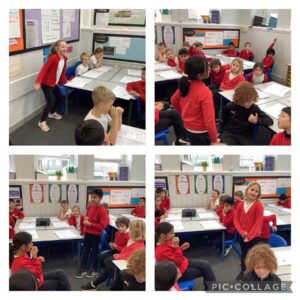Trip to York!
Today, Year 3 and 4 visited York to go to the Yorkshire Museum and to see the flood defences.
Yorkshire Museum had exhibitions that were perfect for us to link to our History and Science learning; Roman York and Mary Anning Rocks and Yorkshire’s Jurassic World!
Here’s some pictures of us exploring and learning about the artefacts!
Our second reason for visiting York was for the flood defences. York gets flooded quite easily after periods of heavy rainfall so they have built many flood defences around river to help the houses and buildings near. We’ll be learning about this during our Geography topic after Easter.
To no surprise, there were floods when we visited! Here’s what we saw:


We made sure to stay safe while walking through York and around the river by walking in pairs and behind the railings.
Help at home by asking your child one new fact that they learnt while at the museum! For example, I learnt about the different under water dinosaurs that existed millions of years ago.
Spring 1: Week 4
This week, we’ve been super busy being superheroes! We tried using our super speed, super strength and super writing skills to capture the Evil Pea. We made wanted posters and thought of sentences to describe the Evil Pea.
He has a red cape.
He is round.
He is green.
He has a black mask.

We’ve witnessed many determined superheroes trying to solve crimes and capture the Evil Pea. From finding and writing clues to building traps and recording messages on the iPads in the construction area, we’ve seen some fantastic team work!





Yesterday, we thought about what superpower we would have if we were superheroes.





 This morning, two PCSOs visited us. They talked about their role and how they help people in our local community. We had lots of fun trying on police costumes and going in the police car.
This morning, two PCSOs visited us. They talked about their role and how they help people in our local community. We had lots of fun trying on police costumes and going in the police car.


 Maths
Maths
In maths, we continued to develop our understanding of composition. We used the Hungarian number pattern (die pattern) to explore making 5. We used the ‘5 Little Aliens in a Flying Saucer’ song to help us remember the pairs of numbers that make 5. On Wednesday, we noticed there wasn’t enough space for 6 aliens on the die frame. Therefore, we used a double dice frame to explore numbers 6 and 7 that are composed of ‘5 and a bit’. 
Help at home: Number bonds to 5 game
- Put 5 small things into a bag.
- Ask your adult to take some things out of the bag.
- Then, you take the rest of the things out of the bag.
- How many things does your adult have? How many do you have?
- How many altogether?
Phonics
This week, we learnt our final phase 3 graphemes (air, er) and tricky words (are, pure, sure)
Next half-term, we’ll revisit all of the phase 3 digraphs and trigraphs. We’ll also be reading words with:
– double letters (h-a-mm-er)
– two or more digraphs (ch-a-tt–er)
– ending in –ing (l-oo-k/i-ng)
– s /z/ in the middle (visit sounds like v-i-z-i-t)
– s /s/ /z/ at the end (c-oo-k-s)
– es at the end (t-or-ch-es)
Help at home: Play tricky word SPLAT
- Write a selection of tricky words on paper/sticky notes.
- Place around the room or on the floor.
- Say a tricky word for your child to jump or splat the words.

Poetry Picnic
This week’s poem was an eight-line poem called A Little House.
Reminders
- Parent-teacher meetings – Tuesday 06 & Thursday 08 February
I look forward to chatting to you all in person next week. - Fiddly Fingers stay & learn session followed by a presentation and coffee morning – Monday 05 February 9am-10am
Why was the early Islamic civilisation considered a golden age?
In our history topic, we’ve been learning about the innovations of the early Islamic civilisation – a golden age.
Help at home by asking your child to explain what’s going on in each stage of our lesson using the pictures below.

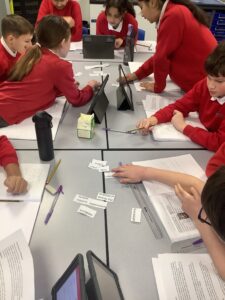


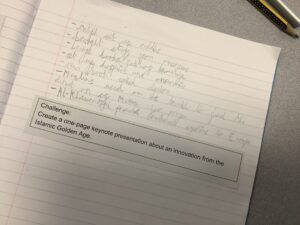



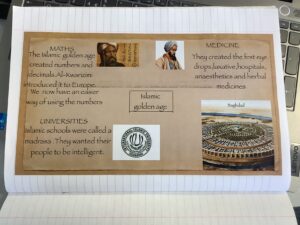
Viking recounts
Over the last two weeks, Y6 have been writing a recount. It linked to our class novel, Viking Boy, where we described witnessing a raid on a farm and the untimely death of the main character’s father.
This writing was a little different because each child chose their own R2s (what you must remember to include in your writing). Take a look at the example below.

A standout success for the class has been our powerful vocabulary as well as using speech to convey character and advance the action.
Help at home by continuing to practice writing speech and using the reporting clause in different places.
Have a read of some excellent examples below.








Science – What are soils made of?
In Science, we have been chemists because we are learning about rocks, fossils and now soils!
So, what are soils made of? We spent the lesson using secondary sources of research (research done by someone else) and our own primary research (research done by us) to answer this question.
Soil is made of:
- tiny rocks
- humus (dead and rotting plants and animals)
- water
- air
We went out into the playground to find some soil to see if we could see these things! After we’d done this, we made lots of careful observations.
Here’s some of what we said:
- Some of our soils are wetter and darker than the others.
- I can see little roots (humus) in the soil.
- We’ve got a tiny worm in our soil!
- Our soil looks very similar to loam soil.
Help at home by trying to find all of those ingredients for soil at the park or at home! Can you see the air?
Living and Learning: drug education
A drug is a substance that changes the way the body or mind works.
In year 2, we have been learning about different things that go into our bodies and onto our skin and about keeping safe around household products and medicines.
Firstly, we considered what should go on and in our bodies and also what shouldn’t go in our bodies.
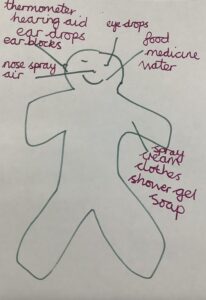
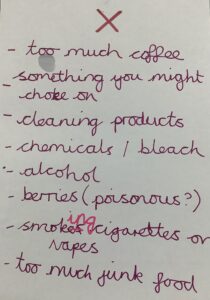
Our second lesson focused on medicines; what they look like, how they are used and why people use them. We talked about how some medicines are used to treat people when they are ill as well as how some medicines can help protect people from becoming ill in the future such as vaccinations.
We thought about the people that can help us stay well and who might help us if we are ill.
The children had a lot to share in this learning and were very clear about the message of keeping safe around these products.
This learning was also reinforced by a visit from D:side. Dave’s session helped the children to understand
- How to keep our bodies clean and healthy.
- Reasons for choosing a healthy lifestyle and the negative impact a lack of personal hygiene / sleep / activity can have on physical and mental wellbeing.
- How to identify internal parts of the body and their position and function to help with a healthy lifestyle.
Help at home: talk about products and medicines that are at home and how and why they are kept safe.
We are editors!
Yesterday, we wrote ‘The next adventures of the Naughty Bus’ and the story writing was brilliant. We included adjectives to add more information about nouns in the story and conjunctions to add more detail to our sentences.
Today, Year 2 have done some excellent editing. We edited a piece of writing together, did some paired editing and then we independently edited. All the children were responsible and respectful whilst listening and giving feedback to their partner. Well done for being fantastic editors Year 2!
Help at home by asking your child to edit some writing you have written with some simple mistakes in. Can they correct missing full stops, capital letters and commas or up level a sentence with an adjective or conjunction?
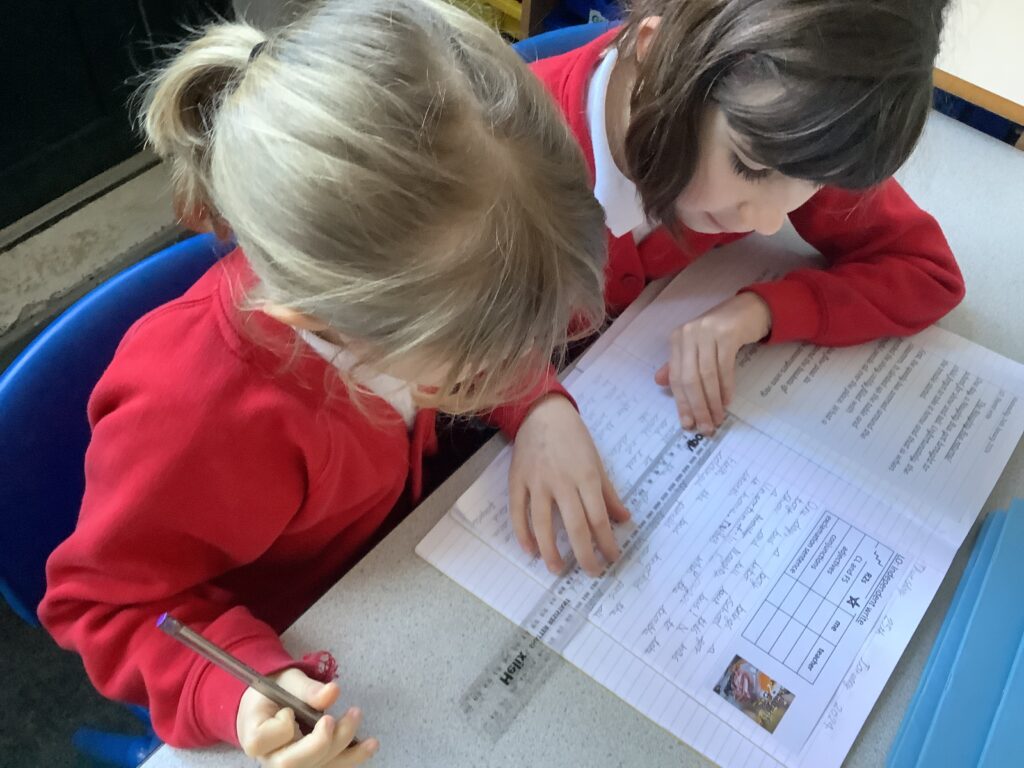
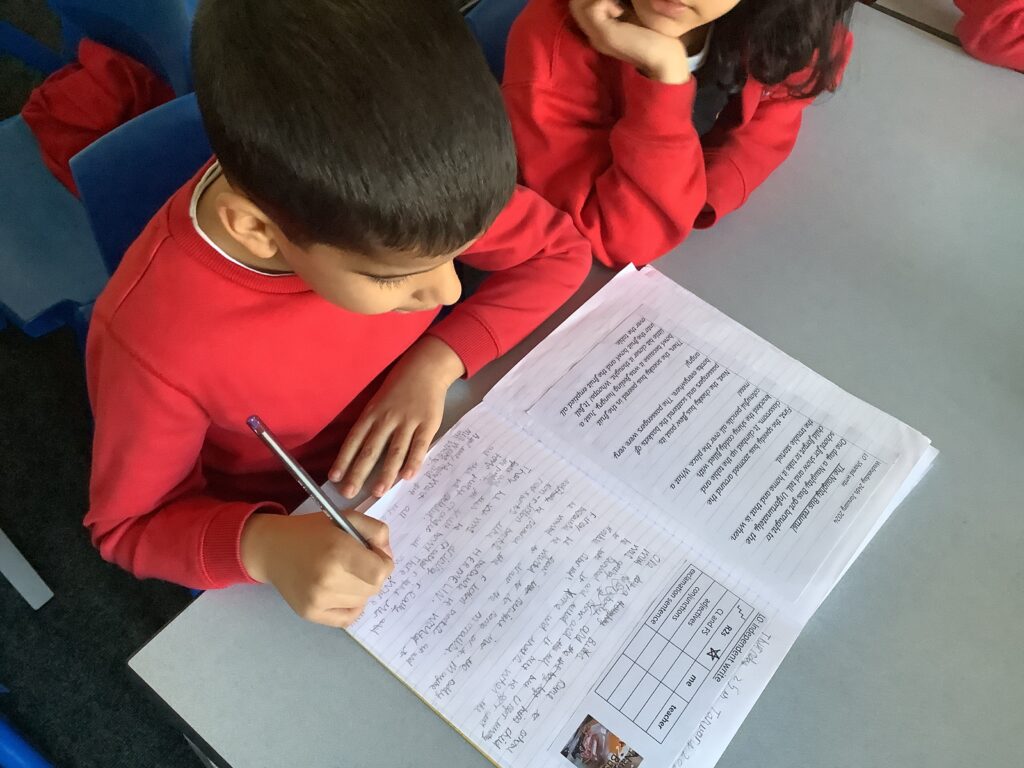

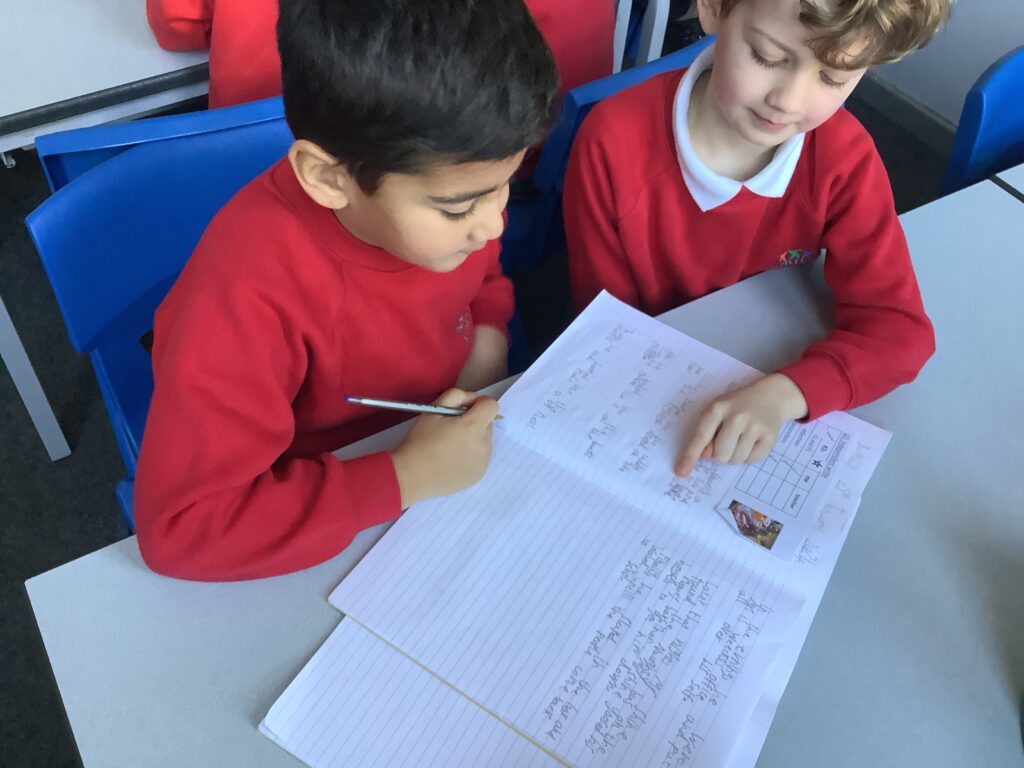
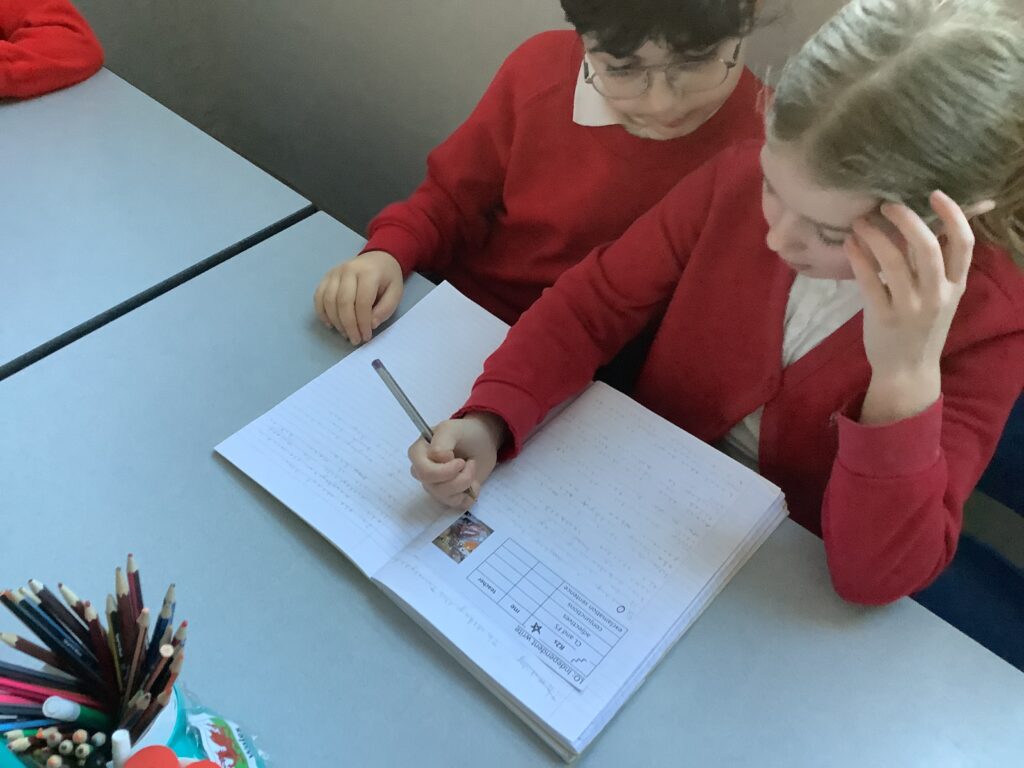
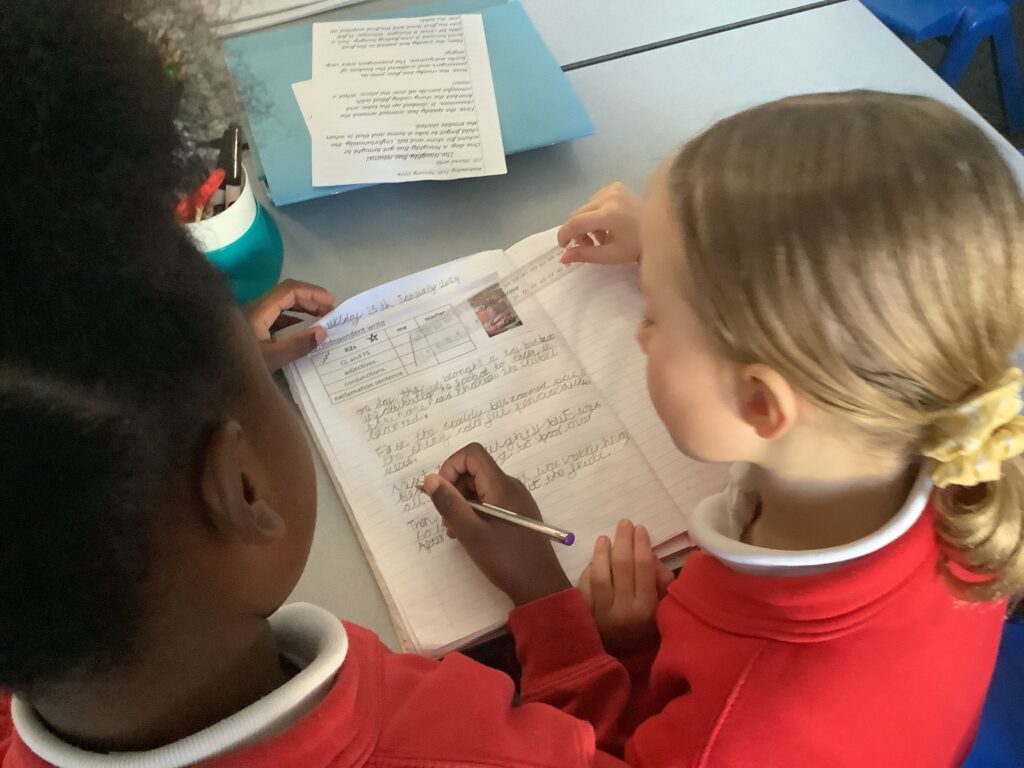
We are biologists!
At the start of this half term, we planted some daisy seeds as part of our science learning. We looked at what a plant would need to grow and how we look after it. We had to be very careful with the seeds as they were very small. First, we scooped some compost into our pot and pressed it down. Then, we put two seeds on top of the compost. Finally, we added some more compost on top and watered it. We will keep track of our seeds throughout the rest of Year 1.
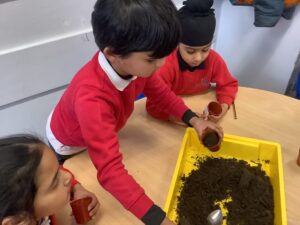
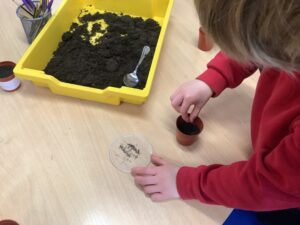
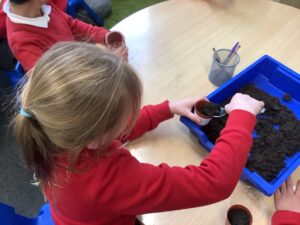
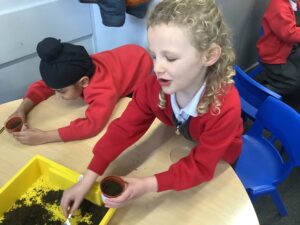
Our seeds on 12/01/24. Our seeds on 25/01/24 (some little seedlings starting to show.)
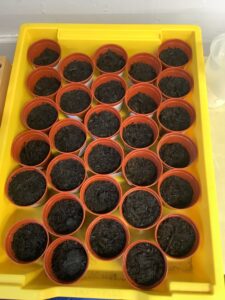
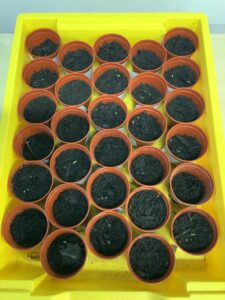
Help at home by looking out for new plants growing in the park or in the garden. What parts of the plant can you see?
History – We are the Celts!
In our History lessons, we have been learning all about the Iron Age.
The Iron Age came before the Romans and the Celts, who lived in Britain at the time, led a very quiet life. They were farmers and lived in small tribes until…
43AD when the Romans invaded.
When the Romans invaded, the Celts had a choice:
Give in to the Roman rule which meant having to pay taxes but they got to stay on their land.
or
Resist and rebel against this and possibly end up dying.
It might sound like an easy decision but it wasn’t! As a class, we thought of all the reasons for and against and then had a class debate. We tried our best to be respectful by using sentence starters like, “I see what you’re saying but…” and “That’s a good point but I disagree because…“.
Here’s some pictures of us!
Help at home by having a respectful debate about what you might have for dinner! “I think we should have pesto pasta with chicken because it has protein and carbohydrates…”
Living and Learning – I know some drugs that are harmful and how to stay safe.
Over the last 2 weeks, we have had a focus on drugs, how they can be harmful and how we can be safe around them.
Drugs can come in all different shapes and sizes but they all do change the way the body or mind works.
We had a focus on medicines like Calpol and household items like cleaning products. We discussed when we might need to take or use medicines and how we might use these items.
We decided that:
- We should only take medicine if we are unwell and need it.
- We should always ask an adult before we go near a medicine or cleaning product as they can be dangerous if not used correctly.
- Even adults need to read the instructions on the medicine or cleaning product.
- These items should be kept out of reach of young children.
For example, dishwasher tablets could look really like a sweet to a baby and they might put it in their mouth! Help at home by asking your child to help you keep these products in a safe place.







